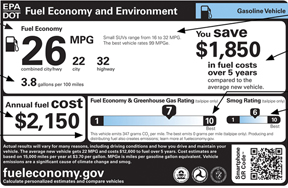What EPA's $100 Million Clean Air Act Settlement Against Hyundai, Kia Means
 On November 3, the United States Environmental Protection Agency (EPA) announced its largest Clean Air Act (CAA) settlement ever in an enforcement action against Hyundai and Kia. EPA alleged that the two automakers inflated the certification of their cars’ greenhouse gas (GHG) emissions. As a result, the car companies agreed to pay a $100 million penalty, forfeit 4.75 million GHG emission credits, and spend millions of dollars to develop better emission testing procedures to prevent future violations.
On November 3, the United States Environmental Protection Agency (EPA) announced its largest Clean Air Act (CAA) settlement ever in an enforcement action against Hyundai and Kia. EPA alleged that the two automakers inflated the certification of their cars’ greenhouse gas (GHG) emissions. As a result, the car companies agreed to pay a $100 million penalty, forfeit 4.75 million GHG emission credits, and spend millions of dollars to develop better emission testing procedures to prevent future violations.
In April 2010, EPA along with the National Highway Traffic Safety Administration (NHTSA) issued regulations setting Corporate Average Fuel Economy (CAFE) standards for light-duty vehicles for the 2012 to 2016 model years. The regulations require a phased reduction in GHG emissions fleet-wide through improvements in gas mileage in light-duty vehicles with improvements year to year. Beginning with the 2012 model year, fleet-wide standards must meet 30.1 mile per gallon (MPG). From 2013 to 2016, the mileage requirements then move to 31.1 MPG, 32.2 MPG, 33.8 MPG, and 35.5 MPG, respectively.
The improvement in gas mileage translates to a reduction of GHG emissions for combined cars and light trucks from 295 grams of carbon dioxide (CO2) in 2012 to 250 grams of CO2 by 2016. EPA anticipated that GHG emissions reductions for cars and light trucks from 2012 to 2016 would be in the range of 960 million metric tons. Interestingly, measurement of the emission of carbon from vehicles during laboratory testing has traditionally been the way fuel economy is calculated, even before GHG regulations. In practice, CAFE performance has exceeded targets for each year the standards have been put into place.
EPA conducted an audit of Hyundai’s and Kia’s testing protocols and concluded that these had the effect of overestimated the fuel economy ratings, which in turn underestimate their fleets’ GHG emissions by 4,750,000 metric tons. In addition to the fines for inaccurate reporting, Hyundai and Kia lost the ability to sell 4,750,000 GHG emission credits, which are worth over $200 million.
The settlement requires that the car companies fix their certification procedures and audit their fleets to confirm the gas mileage on their vehicles’ stickers. In essence, EPA is not just saying that the settling parties failed to comply with their reporting obligations to EPA, but also to the consumers of their products, who had an expectation that the sticker mileage rates were accurate. EPA estimated that the cost of correcting their procedures to be in the range of $50 million. In all, this will be a very expensive lesson for the car companies.
Going forward, the initial phase of GHG regulations and the second phase for the 2017 model year and beyond will continue to require testing by all auto manufacturers. Also, other regulations that require confirmatory testing also apply to GHG for heavy-duty vehicles and non-road equipment. EPA will continue to audit those results and failure to comply will lead to similar results.
 On November 3, the United States Environmental Protection Agency (EPA) announced its largest Clean Air Act (CAA) settlement ever in an enforcement action against Hyundai and Kia. EPA alleged that the two automakers inflated the certification of their cars’ greenhouse gas (GHG) emissions. As a result, the car companies agreed to pay a $100 million penalty, forfeit 4.75 million GHG emission credits, and spend millions of dollars to develop better emission testing procedures to prevent future violations.
On November 3, the United States Environmental Protection Agency (EPA) announced its largest Clean Air Act (CAA) settlement ever in an enforcement action against Hyundai and Kia. EPA alleged that the two automakers inflated the certification of their cars’ greenhouse gas (GHG) emissions. As a result, the car companies agreed to pay a $100 million penalty, forfeit 4.75 million GHG emission credits, and spend millions of dollars to develop better emission testing procedures to prevent future violations.